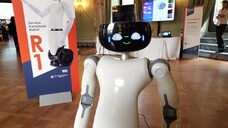The first robotic seeds to be produced in Italy are fluorescent and printed in 3D and they will help to protect the environment by monitoring soil temperature without the use of wires or electronic circuits.
They have been designed and built at the Italian Institute of Technology (IIT) in Genoa by the group of researchers led by Barbara Mazzolai. The research, conducted in collaboration with the Leibniz Institute for New Materials, is funded by the European Union as part of its I-Seed project coordinated by IIT.
Described in the journal Science Advances, the artificial seeds belong to the family of soft robots, i.e. they are made of non-rigid materials. They are called Acer i-Seed and are printed in 3D to resemble the natural seeds of a species of maple tree native to Europe, the Acer campestre. When mature, these seeds detach from the plant and, due to their particular shape, move like a helicopter blade, reducing the speed of descent and therefore increasing their chances of being dispersed by the wind over long distances. The robotic seeds are made of a biocompatible and compostable material and can be sown over very large areas with the help of drones.
Riproduzione riservata © Copyright ANSA












